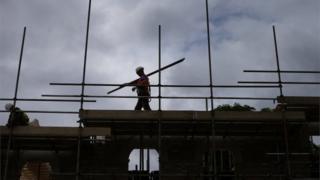Coronavirus: PM pledges to ‘build back better’ post-virus
 Image copyright Reuters
Image copyright Reuters Boris Johnson will promise to «build back better» as he unveils government plans to soften the economic impact of coronavirus.
Speaking in the West Midlands, the prime minister will say he wants to use the coronavirus crisis «to tackle this country’s great unresolved challenges».
As part of a «new deal», Mr Johnson will set out plans to «bring forward» £5bn on infrastructure projects.
Labour called for a «laser-like focus» on preventing job losses.
The prime minister’s speech comes as BBC analysis found that the UK was the hardest hit of all the G7 major industrialised nations by the virus in the weeks leading up to early June.
In April, the UK economy shrunk by a record 20.4% as a result of the spread of coronavirus and the subsequent lockdown measures.
In a bid to boost the country’s financial outlook, Mr Johnson will pledge to put jobs and infrastructure at the centre of the government’s economic growth with a commitment to «build, build, build».
Aiming to emulate the New Deal policies of the depression-era American President Franklin D. Roosevelt, Mr Johnson will say he wants a government that «puts its arms around people at a time of crisis».
In the aftermath of the Wall Street Crash of 1929, President Roosevelt launched one of the largest, most expensive US government programmes which included building schools, hospitals and dams.
Mr Johnson will say he wants to use the coronavirus crisis as an opportunity to «to build the homes, to fix the NHS, to tackle the skills crisis, to mend the indefensible gap in opportunity and productivity and connectivity between the regions of the UK».
«Too many parts of this country have felt left behind, neglected, unloved, as though someone had taken a strategic decision that their fate did not matter as much as the metropolis.
«And so I want you to know that this government not only has a vision to change this country for the better, we have a mission to unite and level up.»
Projects in the £5bn investment plan includes:
- £1.5bn for hospital maintenance, eradicating mental health dormitories, enabling hospital building and improving A&E capacity
- £100m for 29 road network projects including bridge repairs in Sandwell and improving the A15 in the Humber region
- £900m for «shovel ready» local projects in England this year and in 2021
- £500,000 – £1m for each area in the towns fund to spend on improvements to parks, high street and transport
- Over £1bn to fund a schools building project, as announced on Monday
- £83m for maintenance of prisons and youth offender facilities, and £60m for temporary prison places.
The government says it will bring forward funding to «accelerate» infrastructure projects in Scotland, Wales and Northern Ireland.
Chancellor Rishi Sunak will provide an update on the economy next week and in the autumn the government will publish a National Infrastructure Strategy.
A Downing Street statement said that «while in the long-term the government must set a path to balance the books, the prime minister is clear that we will not do so at the expense of investing now in the productive potential of the economy, or at the expense of the resilience of the UK’s public services».
Responding to the announcement, Labour’s shadow chancellor Anneliese Dodds said: «Our country is suffering the worst economic hit of all industrialised nations, but instead of the back-to-work budget our country needs focusing on one thing – jobs, jobs, jobs – the chancellor will only be providing an ‘update’ on the economy.»
She urged the government to «abandon their ‘one-size-fits-all’ approach to the economic support schemes» and instead offer «concrete action and a laser-like focus preventing further job losses and supporting future employment».
Liberal Democrat education spokeswoman and party leadership contender Layla Moran said Mr Johnson’s speech looked like «a rehash of manifesto pledges» and accused the government of «running out of ideas».
Federation of Small Businesses (FSB) national chairman Mike Cherry said the announcement was «encouraging» but said it was important that small businesses were not «locked out of the ambition to build… because of cumbersome public sector procurement rules».
And British Chamber of Commerce director-general Adam Marshall said the government’s plans had to «take shape on the ground swiftly to give a real confidence boost to businesses and communities».
For weeks ministers, including Mr Johnson, have been promising a bold green recovery package to create jobs whilst cutting carbon emissions. In the pre-released summary of his speech the prime minister did pledge to «build back greener» – but some environmentalists consider his response inadequate.
The think tank Green Alliance, for instance, calculates that ministers need to spend £14bn to meet CO2 targets. It says the government is spending £9bn on projects that actually harm the climate.
Mr Johnson re-iterated a policy of planting 75,000 acres of forest a year and said he’d create new conservation rangers.
But he didn’t mention home insulation – the sector consistently judged best for cutting emissions and creating jobs.
And there was no suggestion of scaling back the £27bn roads programme, which will increase emissions and is judged by the Trades Union Congress to be poor value for job creation.

